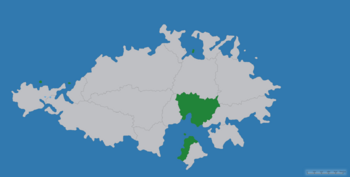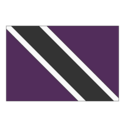Icardia: Difference between revisions
Agrincourt (talk | contribs) No edit summary |
Agrincourt (talk | contribs) No edit summary |
||
| Line 60: | Line 60: | ||
The history of Icardia stretches back several millennia. The modern state came to be in the aftermath of the [[Revolutions of 1859]], during which the last King of Icardia was overthrown. A period of civil war followed between the 'White' pro-monarchy faction and the 'Blue' republican faction. The armed conflict, characterized by bitter fighting, lasted until 1870 with hundreds of thousands dead and the Republican faction eventually securing victory. | The history of Icardia stretches back several millennia. The modern state came to be in the aftermath of the [[Revolutions of 1859]], during which the last King of Icardia was overthrown. A period of civil war followed between the 'White' pro-monarchy faction and the 'Blue' republican faction. The armed conflict, characterized by bitter fighting, lasted until 1870 with hundreds of thousands dead and the Republican faction eventually securing victory. | ||
==History== | |||
==Geography== | |||
==Politics== | |||
The [[Constitution of the Icardian Republic]] ratified in 1872 outlines a {{wp|unitary}} {{wp|parliamentary}} {{wp|republic}} with a president as head of state and a prime minister as head of government. The president is directly elected by the people for a term of five years, and they can be re-elected for a maximum of two further terms (three terms in total). The prime minister, on the other hand, is a member of parliament (either the Senate or the National Assembly) appointed by the president. The constitution states that a prime minister must be able to command confidence of the parliament. This usually results in the prime minister being the leader of the largest party within the parliament, but this is not an explicit requirement. | |||
==Economy== | |||
==Demographics== | |||
Revision as of 05:03, 2 June 2021
Republic of Icardia | |
|---|---|
 Location of Icardia within Arcadia including overseas territories (both in dark green) | |
| Capital | Amberg |
| Largest city | Durham |
| Official languages | Icardian |
| Demonym(s) | Icardian |
| Government | Unitary parliamentary republic |
• President | Noah Wilkins |
• Prime Minister | Sophia Brown |
| Legislature | Parliament |
| Senate | |
| National Assembly | |
| Population | |
• 2020 census | 76,077,899 |
• Density | 133/km2 (344.5/sq mi) |
| GDP (nominal) | 2020 estimate |
• Total | £3.897 trillion |
• Per capita | £51,231 |
| HDI (2020) | 0.903 very high |
| Currency | Icardian Pound |
| Driving side | left |
Icardia, officially The Republic of Icardia, is a sovereign nation located in Arcadia. The main body of Icardia (referred to as Metropolitan Icardia) is located in the southern-central part of the continent, situated within the Bay of Chishil and with its northern border running along the Central Western Highlands. It is bordered by the Lohti Republic to the west, the Republic of the Isaar to the north-west, the Commonwealth of Neria directly north, and the Republic of Holteria to the east. As a result of numerous overseas territories, it also shares a maritime border with Neria, the Federation of Aquitaine, and the Kingdom of Wisdonia. It is the second most populous country in Arcadia, after Aquitaine, with a population of 76 million across an area of 572,000km2.
The history of Icardia stretches back several millennia. The modern state came to be in the aftermath of the Revolutions of 1859, during which the last King of Icardia was overthrown. A period of civil war followed between the 'White' pro-monarchy faction and the 'Blue' republican faction. The armed conflict, characterized by bitter fighting, lasted until 1870 with hundreds of thousands dead and the Republican faction eventually securing victory.
History
Geography
Politics
The Constitution of the Icardian Republic ratified in 1872 outlines a unitary parliamentary republic with a president as head of state and a prime minister as head of government. The president is directly elected by the people for a term of five years, and they can be re-elected for a maximum of two further terms (three terms in total). The prime minister, on the other hand, is a member of parliament (either the Senate or the National Assembly) appointed by the president. The constitution states that a prime minister must be able to command confidence of the parliament. This usually results in the prime minister being the leader of the largest party within the parliament, but this is not an explicit requirement.

